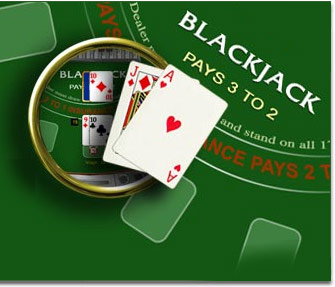Rigged Online Blackjack
Can Online Blackjack be Rigged?
"Has anyone actually won money playing online blackjack?"
"The dealer gets twice the blackjacks as the player, 8 in 100 hands, and the dealer always wins more doubles."
"It would be more likely that I would get hit by lightning than suffer the results I did."
The preceding statements were taken from message boards which specialize in online gambling discussions. While many players believe just the opposite, a growing minority are convinced that online blackjack is indeed rigged by the house.
The question this article tries to answer is, "How likely is it that online blackjack is rigged?"
The answer to this question, like almost all questions, is, "It depends." or "Sometimes."
Take, for example, a scam in England which cost an online gambling operation $1.6 million dollars before a rigged blackjack game was discovered, and it's easy to see why many players are so suspicious.
Couple that with the fact that online wagering, once thought of in the same seedy vein as online pornography, has achieved a level of mainstream popularity which attracts thousands of new players daily, often providing easy targets for the unscrupulous and the downright immoral, and you have a situation rife with mistrust and paranoia.
Customers who complain about online blackjack being rigged have four main concerns:
1. Refusal to pay out winnings
Perhaps the worst violation, there is nothing more frustrating than actually beating the house advantage and then finding that your chosen online casino will not pay. And since it is not a land-based business, your odds of recovering the money are very slim.
2. Lengthy delays before winnings are paid out
Almost as annoying as #1, but at least you eventually get what is coming to you.
3. Closures with no warning, without refunding deposited funds
This is a problem almost exclusive to fly-by-night operations and casinos established solely to scam the customer. This problem will almost never be encountered if you choose to gamble at a reputable casino with a solid business history.
4. Use of rigged software, with outcomes not randomly generated
Perhaps even more insidious than not paying out winnings is an online blackjack game which cheats you out of the chance to make a profit in the first place. This subject is often the most passionately debated, because it's almost impossible for the average Internet player to prove it one way or another.
While such crooked software does exist, many blackjack players are just too eager to cry foul when they suffer a bad run, thus casting doubt on the industry as a whole and furthering the overall sense of paranoia. While these concerns might sometimes be real and valid, many gamblers simply ignore the most basic fact of gambling which is constantly staring them in the face.
Every casino in the world, whether it's online or land-based, offers games which give the house an edge (strangely, few people ever complain about losing the lottery, a game where the house, in this case the government, has a huge advantage over the player). No matter what you do, you generally can't beat that edge.
Casinos will always make money. Gamblers, as a general rule, will usually lose money. And the longer you play, the more likely it is that the house edge will catch up to you. That's how it works.
If it didn't, casinos would have gone the way of the dodo a long time ago. But despite this fact, many players continue to claim that online black jack games are rigged, usually citing certain software manufacturers as the real culprits.
Most software makers charge an internet casino between $10,000 and $250,000 to develop a web-based casino, and often the software companies get as much as 30% of the gaming win generated by the site.
With that kind of money on the line, it's small wonder that someone who just lost $1,000 at on line blackjack might grow suspicious.
An authority site in this industry, has said, "Online casinos are fair and honest for the most part. If you stick to the Big Four software manufacturers (Boss Media, Cryptologic, Microgaming, and World Gaming) you shouldn't have to worry about the fairness of the games themselves - the only thing you need to look into is their reputation for support and prompt payments."
An Internet gambling expert who reviews e-casinos says, "CryptoLogic offers about a 98 % return on video poker and blackjack, but, of course, the rules are such that the casino's odds may be a bit higher due to player mistakes. If you want better odds than what the major software-makers offer, you have to venture a bit off the beaten path, but if you do that you risk security."
Considering the above statement, it should then come as little surprise that the problems have occurred almost exclusively at unlicensed and/or unregulated online casinos (it is thought that there are 200+ online casinos operating illegally today).
Casinos licensed by a responsible government are regularly audited and seem to have as few problems as regulated land-based casinos, and the odds they offer are similar.
When considering online blackjack casinos, try looking for the following marks of quality:
1. Software
Reliable and proven software backend that generates random numbers. Probabilities cannot be manipulated by the software backend.
2. Business Practice
Operators have shown a history of stable business operations. No prior fraud convictions, bankruptcies, etc.
3. Fair Play
Look for companies who openly advertise payouts and are audited by a reputable, independent organization. Bonus winners should also be openly advertised to show that reliable payouts have been made.
Anyone, particularly the software developer, can claim any payout percentage they want. Without independent auditing (from a reputable firm like Price Waterhouse Coopers, for example) these numbers mean absolutely nothing.
4. Quick and Reliable Payout Process
Operators must have some type of payment processing that allows for reasonably quick payouts.
5. Playability
Software should be reliable and able to retain the game state in case of dropped connections.
6. Customer Support
Any casino you want to play at should have a toll-free call center and prompt email support. The customer service staff should demonstrate a firm understanding of the product.
7. Disclosure
Virtual black jack casinos should demonstrate full disclosure in releasing details regarding payouts, policies, insurance, etc.
So is online blackjack rigged?
In a sense, all casino games are rigged by paying out at different odds than the true odds. In other words, all casino games have a house edge that is unbeatable.
But usually when someone asks about online casino being rigged, their concern is with whether or not they're getting the same house edge that they would have playing a non-virtual, or brick and mortar version of the game in a land-based casino.
Most of the time, if you're playing at a reputable casino, you will be receiving a fair game, because there is little motivation for an internet casino to cheat with their software. The house edge is already built into the game, so there is no need to cheat in order to win in the long run.
In fact, most online casino operators have plenty of incentive NOT to rig their software. If they get caught, they go out of business, and then their profit margins become 0.


 Black Diamond Casino
Black Diamond Casino


